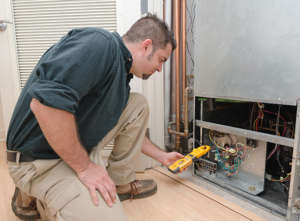
Every home needs a temperature control system that keeps the indoors comfy when the air outside becomes too hot or too cold. Traditionally, homes have used separate appliances to handle heating and cooling, but a heat pump can take care of both tasks. This versatility makes heat pumps efficient and cost-effective.
In this blog, we’ll explore what you need to know if you’re considering a heat pump for your home. You’ll learn how heat pumps work, what types are available, and what advantages they offer over other HVAC systems.
A Refrigerator for Your House
Think of a heat pump as a refrigerator for your entire house. In a refrigerator, the refrigerant coils absorb the heat from inside the refrigerator and release it. This process allows the inside of the refrigerator to stay at a constant, cool temperature.
You don’t want your house to feel as cold as the inside of a fridge, but you do like the air in your house to stay at a cozy temperature. A heat pump makes that feature possible.
In our analogy, the rooms in your house are the inside of the refrigerator, and the heat pump acts as the refrigeration system. You just have to set the desired temperature; the heat pump does the rest.
One last note about how heat pumps work: All heat pumps function by transferring heat from one area to another. With a refrigerator, that heat transfer occurs only in one way, but with a heat pump, the heat transfer can happen in both directions. The pump can take warmth from inside your house and send it outside or grab heat from the outside and bring it into your home.
Many Heat Pump Types
Also like refrigerators, heat pumps come in many different styles. Heat pumps differ mainly in how they gather and transfer heat. The list below goes over the main types of heat pumps:
- Air-source heat pumps. These units take heat from the air and move that heat into or out of your house. These units attach to the ducts in your house, just like a traditional furnace and air conditioner.
- Ground-source heat pumps. These heat pumps use underground tubes filled with fluid to transfer heat. The liquid in the tubes captures or releases heat into the ground as it circulates through the system.
- Absorption heat pumps. These units function like air-source heat pumps, but they use a power source that’s not electricity. For instance, some absorption heat pumps run on solar power.
Some regions make certain heat pump styles more feasible than others, so be sure to consult an HVAC professional as you consider your choices.
All the Advantages of Heat Pumps
As mentioned before, heat pumps are among the most cost-effective and efficient heating and cooling systems available. These systems have those qualities because many heat pumps are mini-split systems. With this type of system, smaller heating and cooling units reside in various rooms of your house. You don’t have to run all the units at once, so the system uses less energy and costs you less money to operate.
Heat pumps also have a good reputation with homeowners who prioritize green energy options. Unlike fuel-burning furnaces, heat pumps almost always run on electrical energy. When they operate, heat pumps don’t burn fossil fuels, a practice that contributes to global climate change. But keep in mind that some electricity is produced by burning fossil fuels, such as coal.
What if you have an older home? Is it too late for you to get a heat pump? Actually, many heat pumps are simple to retrofit into existing buildings. For example, a ductless heat pump allows you to upgrade your heating system and add air conditioning, all with one installation.
As far as day-to-day use, heat pumps have some additional advantages you should be aware of. They don’t turn off and on as frequently as furnaces and air conditioners, so many users appreciate the extra quiet. Plus, they also distribute heat more evenly, so you won’t notice as many cold spots.
Final Considerations
Because heat pumps have so many advantages, they almost sound too good to be true. Before you rush out and get a heat pump for your house, though, you should be aware of these additional facts about how they work.
First, the warm air released by heat pumps tends not to be as hot as the air from a fuel-burning furnace. Consequently, many people go through a slight adjustment when they switch from a furnace to a heat pump. Still, many people find that they like the steady heat of a heat pump better overall.
Second, heat pumps tend to operate best in moderate climates where temperatures never become excessively hot or cold. Heat pumps need more energy to transfer heat from very cold areas or very hot ones, so they’re less efficient in these climates. However, newer styles of heat pumps known as all-climate units are designed to be efficient in areas where temperatures often drop below freezing.
Now that you know these final considerations, you’re ready to decide if you want to replace your current HVAC system with a heat pump. Talk to an HVAC professional if you have additional questions.

